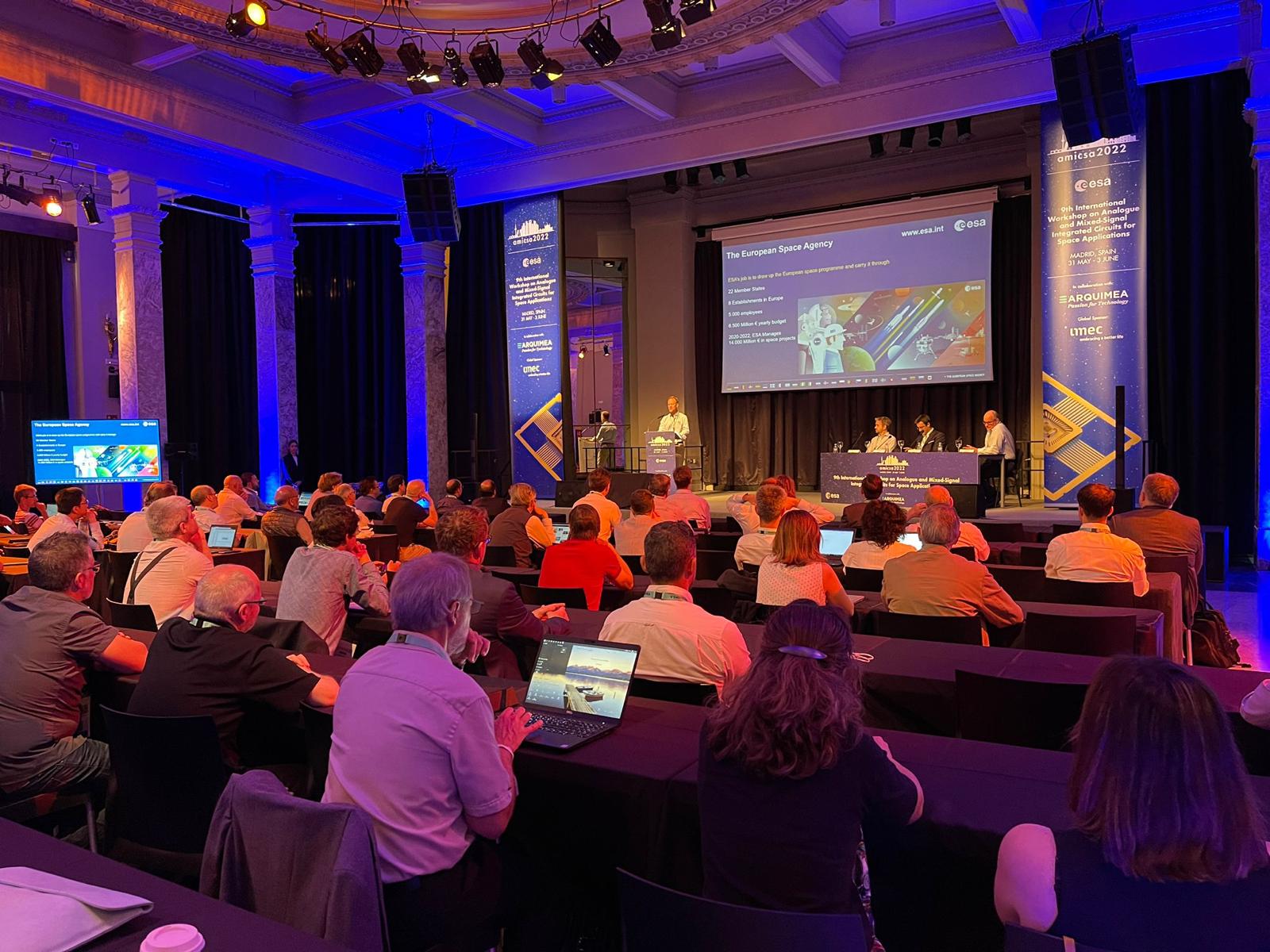- Sectors
- Aerospace & Defense
- Big science
- Biotechnology
- Fintech
- Work at ARQUIMEA
- Insights

Madrid, 1 June – AMICSA 2022 Congress open its doors after the COVID-19 pandemic. The 9th International Workshop on Analogue and Mixed-Signal Integrated Circuits for Space Applications Congress was inaugurated by Diego Fernández, President of ARQUIMEA, Markus Kissler-Patig, Head of the Science and Operations Department of the European Space Agency (ESA) in Spain, Emilio Vez, Head of the Space Programmes Division at CDTI, and Boris Glass, Mixed-Signal Microelectronics Expert at the ESA and coordinator of AMICSA. The European Space Agency organizes this congress in collaboration with ARQUIMEA in Madrid.
AMICSA 2022 is being held from 1 to 3 June at the Círculo de Bellas Artes in Madrid, and will draw around one hundred international experts in analogue and mixed-signal integrated circuits for space applications. The congress coincides with the launch of the PERTE Chip, which should serve as a boost for Spain’s capabilities in the area of the microelectronics industry. This drive is key to consolidating the leadership of Spanish microelectronic companies in the aerospace sector.
Diego Fernández, president of ARQUIMEA, which has partnered with the ESA to organise this congress, was entrusted with inaugurating the event and after thanking the attendees for their presence, he took the opportunity to talk about the importance of a “growing sector” and indicated that “as companies, organisations and society we cannot be left out of a key sector”. During his talk, he presented the “Beetlesat” satellite constellation that the company is working on to put 250 satellites into orbit over the next few years.
Markus Kissler-Patig, Head of the Science and Operations Department at ESA, highlighted the importance of the activity of the European Astronomy Centre in Madrid, located in Villafranca del Castillo, which employs around 400 people.
The Centre for the Development of Industrial Technology (CDTI) has also played a prominent role in the opening session of the congress, as it is one of the leading institutions in the development of technologies in Spain, and Emilio Vez, Head of the Space Programmes Division, stressed that Spain “has been involved in space projects for a long time, for example, with the Copernicus mission. We have a good balance in our national space ecosystem, we have very successful Spanish companies thanks to their enormous capacity. Spain is part of the future and we want to continue to work closely with the ESA. Proof of this is the drive to create the Spanish Space Agency”.
Finally, Boris Glass, Mixed-Signal Microelectronics Expert at the ESA and head of AMICSA welcomed the fact that this year “at last AMICSA could be held in person” and emphasised that the congress will address “all design systems, and therefore we need to be flexible and we are very happy to be able to discuss all kinds of topics”.
The event, which is held every two years, covers topics such as radiation effects on integrated circuits or radiation hardening methodologies using cell, circuit and system design techniques, as well as radiation testing or radiation hardness qualification and quantification of integrated circuits. In addition, topics such as intellectual property and reusability of circuits in space will be addressed, along with the needs and requirements for future space missions.
A space for business
AMICSA 2022 features an exhibition area for the leading companies in this market segment to showcase their innovations directly to all attendees. The exhibiting companies include ARQUIMEA, Alter, Imec, Microchip, Serma TTTech, Trad and Weeroc.
The congress is sponsored by industry-leading international companies, which include: ARQUIMEA, imec, ISD and Novorell.